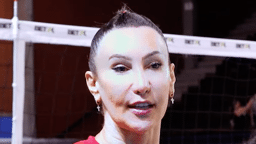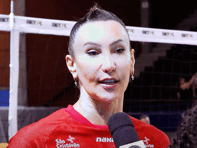What Matthew Mitcham did was fantastic, but what about the out lesbian Olympians?
The gay media are exploding with headlines about "gay hero Matthew Mitcham," who won the individual gold in men's platform diving in Beijing. And there's a bonus: Matthew is colossally cute — sculptured and Greek-goddish. Gay men all over the world are hyperventilating about him. But with all due respect to Matthew, and his colossal achievement, I want to draw attention to several other Beijing heroes who are being forgotten by most of our media.
Let's start with the three lesbians who won gold medals — Natasha Kai on the U.S. women's soccer team, and team captain Gro Hammerseng and her partner Katja Nyberg on the Norwegian handball team.
Oh (you say), but individual gold medals mean more. Really? The Olympics don't give smaller-size medals for team sports. In Beijing they hung the same five-ounce item around the neck of every team member, to point up that individual's supreme value. And I don't see anybody alleging that Michael Phelps' team golds are worth less than the individual golds he piled up.
Besides, being out on a team is a huge achievement. For nearly two decades, LGBT people have been coming out in individual sports like golf and tennis and track. And yes, it's tough to come out in those sports. But coming out in team sports is even tougher. It's the last frontier for us. Teams are where we face the sharpest, most daunting homophobia from all sides — from teammates, coaches, owners, managers, sponsors, fans, and parents of other students if it’s a school team. The homophobia that lesbian and bi team players face is just as fierce as that faced by our men. The fact that our women are playing openly on world-class teams sends a message that doesn't get sent any other way.
So we should put enormous value on the team golds in Beijing. These three women deserve to be called heroes as much as Mitcham does.
And right alongside them, three more female heroes deserve to stand. Namely, the two U.S. softball players, second basewoman Vicki Galindo (bi) and catcher Lauren Lappin (lesbian), who won silver medals. And midfielder Linda Bresonik, who won a bronze with the German soccer team.
Well, (you might say), silver and bronze medals are worth less. Oh yeah? Try telling that to anybody who has won one — especially if they did it the hard way, hanging on to win by a fingernail, with the last gasp of breath.
I first saw this weird attitude about LGBT medals at the 2004 Summer Games, when I was helping Outsports.com cover the Games on their Olympic blog. This was the first Olympics where our media actually put together a pre-Games "list of out athletes" who had made themselves publicly visible. In Athens we had 11 — count 'em. By the end of the Games, our heroes had raked together six medals in both individual and team sports. German fencer Imke Duplitzer won a team silver in épée. Spanish tennis player Conchita Martinez took a silver in women's doubles. German cyclist Judith Arndt won silver in the women's road race. Dutch swimmer Johan Kenkhuis got silver in the men's 4×100 freestyle relay swim. Last but not least, U.S. equestrians Robert Dover and Guenther Siedel won team bronzes in dressage.
After Athens, was there an outburst of headlines about "gay or lesbian heroes?" Of course not. Why? Nobody had won a gold medal. The message sent by the gay media was a dismal one – gold individual medals are good, but silver and bronze team medals are not worth mentioning. I can't think of a better way to break an LGBT athlete's heart.
With the Beijing Games, I'm seeing an eerie repeat of the same attitude. Once again, there was a list of 11 LGB athletes (no T's that I know of). Things got off to a good start when the list of 11 was widely posted through the media. But after that, only a tiny handful of publications, notably Outsports.com, Southern Voice and a few others, tracked the ongoing efforts of the 10 women as well as the one guy. When it was all over, I did my own Google survey and found lots of "gay diving hero" stories that didn't even bother to mention the 10 women.
A story or two even suggested that Matthew was the first out gay man to win Olympic gold. Not so. That honor probably belongs to British figure skater John Curry, who revealed his orientation to the press before the 1976 Winter Olympics, where he won the men’s individual gold. More recently, there was New Zealand rider Blyth Tait, who has been out forever in his home country, and took the individual gold in eventing — a dangerous breakneck horse sport — at the 1996 Atlanta Olympics.
One more question: let's say that it was a gay guy who won the Beijing men's marathon the other day. Let's say that he was your typical marathoner — little and skinny, with a light frame, so his heart could keep the muscles fed for 26.2 miles. In other words, not very sculptural or Greek-god-like. On top of it, our victor was homely as hell, with a big nose and funny hair. The only thing "hung" about him was that gold medal around his neck, and the fact that he knocked three minutes off the Olympic record on a hot humid day. How many "hero" headlines would the gay media cough up for this homely little guy?
So what is it with us? Is the post-Beijing frenzy about Matthew Mitcham not really about his sports achievement? Is it only about how cute he is? If so, that would surely break his heart, considering the effort he made to re-start his diving career after the breakdown he talks about.
Many people in the LGBT community are adamant that closeted athletes should come out. Almost as adamant as they are about closeted politicians. They launch into self-righteous tirades about how important it is for sports figures to be honest about who they are and serve as role models for young people. What kind of message do we send to our young people if only the cute ones get to be heroes? How honest is it to tell them that silver and bronze aren't good enough?
If we want Olympic athletes to risk their careers, maybe their lives, to come out, then more people in our "community" — especially in our media — need to grow up where sports are concerned. What cuts it at the circuit party or on the red carpet is not what cuts it on the diving platform, or the track, or the boxing ring, or the basketball court. It's time for our media to start rewarding our out athletes with the level of educated, sensitive and responsible recognition that all of them really deserve.







































